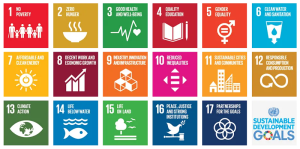Ahead of the SDG Summit, a new UN report by an independent group of scientists launched on Tuesday, September 12, 2023, has called for transformational shifts rooted in science that would urgently reverse course and turbocharge the Sustainable Development Goals (SDGs).

With the world off track to achieving the SDGs, action is needed. Drawing on the latest data and scientific insights, the Global Sustainable Development Report 2023, entitled “Times of crisis, times of change: Science for accelerating transformations to sustainable development,” offers practical solutions to accelerate SDG implementation.
“The 2023 Global Sustainable Development Report helps to shine new light on transformative processes and practices that can help move the world from commitment to action, and from declaration to delivery,” said UN Secretary-General, António Guterres.
At this critical juncture, midway to 2030, the evidence makes clear that incremental and fragmented change is insufficient to achieve all 17 SDGs in the remaining seven years, or even by 2050. Instead, strategic, whole-of-society transformations are needed. And this must be achieved globally – leaving no country, society or person behind.
Science must play major role in advancing sustainable development
Science must play a major role in advancing sustainable development providing evidence to support the emergence of innovations and dismantle negative pathways or paradigms. The report calls on universities, policymakers and research funders to increase support to research guided by the 2030 Agenda, especially in the Global South. To be meaningful, science needs to be transparent, inclusive, and transdisciplinary – produced in diverse contexts by heterogeneous and multidisciplinary groups engaging all possible actors, including youth.
GSDR Co-chair Imme Scholz, Co-president of the Heinrich Böll Foundation, says: “Science is essential, but not sufficient in itself. Good policymaking combines scientific insight with social norms and with what people need, want, and are prepared to give. This includes spelling out the costs and benefits of transformation and defining a just transition.”
An interconnected and systemic approach will be key
The report shows new evidence that understanding the interconnections between individual goals will be essential. Decision-makers must devise policies that manage difficult trade-offs and avoid international spillovers – for example, rising carbon emissions in one country due to the production of goods consumed in another.
The scientists have found that there are more synergies than trade-offs between the SDGs, especially when investments are made in poverty reduction, health, education, gender equality, water and sanitation, clean energy and partnerships. For example, there is evidence that investments in photovoltaics not only directly support access to affordable and clean energy (SDG 7), they also indirectly support progress on education (SDG 4) by enabling students to spend more time on their studies with access to better quality light while reducing indoor air pollution.
The ways synergies and trade-offs materialise in practice can vary across contexts, so the report calls for researchers and policymakers to analyse these locally and develop policies that fit specific needs and address specific trade-offs.
Promising interventions for transformations need to be accelerated and stabilized
The report provides detailed guidance on how different societal actors can shape transformations for sustainable development and actively accelerate progress, noting that interventions in certain areas – such as sustainable food systems, human well-being or energy decarbonisation with universal access – can have systemic effects. The scientists advise policymakers to target such entry points, applying levers like governance, science and technology, business and finance, individual and collective action, and capacity-building toward transformation.
Capacity-building in all countries is also highlighted as a cornerstone of transformations, and this includes everyone – scientists, policymakers, public administration at all levels, the private sector and civil society. This requires boosting scientific literacy, restoring trust in scientific data and evidence, and increasing investment in the areas of strategic direction and foresight.
The report also shows how interventions need to change across stages of transformation. For example, the emergence of a new technology or practice, such as the valuation of women’s care work, requires incentives from government or the private sector that change behaviour and scale up innovations. Conditions that trigger experimentation, innovation and learning can help.
Acceleration requires support to these products and practices, for example tax incentives for electric vehicle use or tighter regulations on acceptable emissions standards from road vehicles, so they gain momentum and reach tipping points beyond which they are widely shared and adopted. Stabilisation requires resilient infrastructure, regulations, user habits and standards that ensure technologies and practices become the new normal. The report emphasises that this may also require addressing unintended consequences such as job losses or the decline in regional industries and economies with a just transition.
To effectively leverage these shifts, the report calls for the establishment of an SDG Transformation Framework for Accelerated Action by 2024 that brings together local action with international cooperation reflecting contexts, needs, aspirations and capabilities. The scientists urge countries to develop national plans for coordinated SDG action with local governments, businesses and industry associations, and institutional investors developing similar plans. Partnerships between all parts of society are needed to achieve the goals.
The Global Sustainable Development Report
The quadrennial Global Sustainable Development Report was mandated by the United Nations General Assembly, to inform the SDG Summit. It has been drafted by an independent group of 15 scientists appointed by the United Nations Secretary-General. The scientists represent diverse disciplines in the natural and social sciences and hail from both developed and developing countries.
